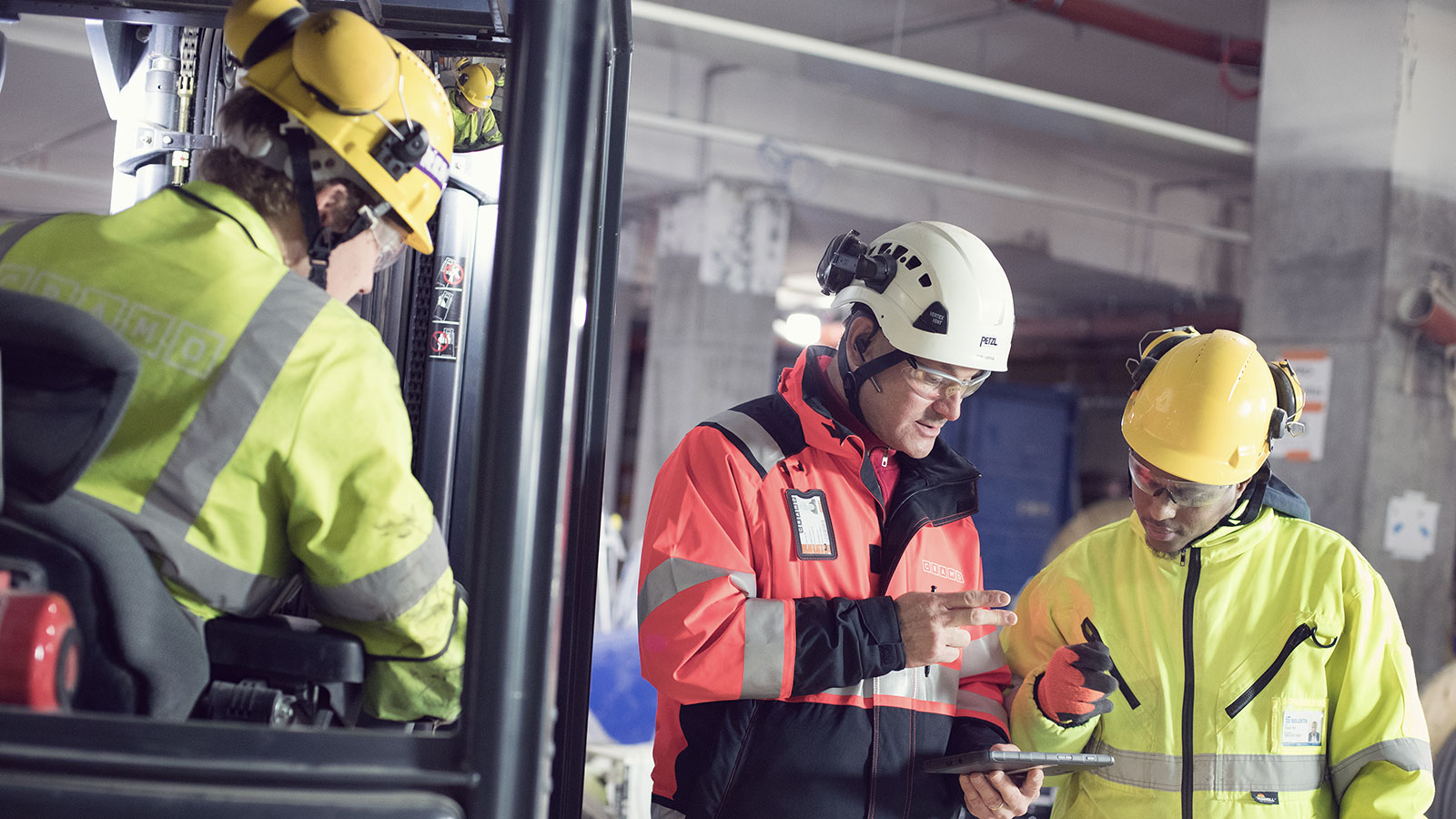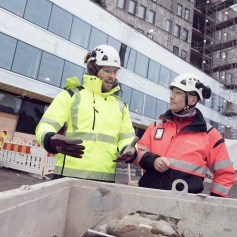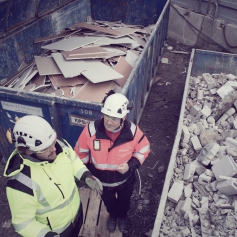Cramo Care – a successful strategy for integrating a sustainability perspective in Cramo’s entire operation
Contributing to a sustainable world by driving the sharing eonomy
A central part of Cramo’s sustainability strategy is to actively develop a Professional sharing economy, defined as “A collective term for B2B activities aimed at increasing resource efficiency by providing temporary access to underutilized physical assets, thereby effectively reducing environmental impact”.
The principle of increased resource efficiency through higher capacity utilization has constituted the basis of Cramo’s business model for over half a century. The concept of a Professional sharing economy is a natural continuation of that mission. The notion of sharing of idle capacity is central to the definition of the professional sharing economy, because it is the key link to resource efficiency and reduced environmental impact.
The key difference between professional and peer-to-peer sharing is that professional sharing by definition is sustainable. By only including the professional sharing of under-utilized physical goods, the concept automatically excludes sharing activities with no link to increased ecosystem value.
Another feature of “professional sharing” is its close relation to “responsible sharing”. Not only does it imply making business based on connecting supply and demand of idle resources. Actors in the “professional sharing economy” have a vested interest in handling the physical resources responsibly: by careful supplier selection, social and environmental aspects are ensured also earlier in the value chain; by careful service, maintenance and up-grading equipment performance is up-held or improved; by user training and instructions a safe handling is secured; by structured out-phasing re-use and circularity is improved.
Driving forces
The sustainability strategy “Cramo Care” supports Cramo’s business by:
- Maximizing ways we can make a positive impact for our stakeholders
- Enabling customers to meet their top sustainability targets and innovate their ways of working
- Meeting expectations from investors to reduce their non-financial risks and maximize returns
- Provide a future-focused and caring workplace where employees can reach their full potential
- Equip our organization for the future – by meeting evolving criteria of standardisation organisations and creating efficient operations
- Targeted stakeholder dialogues, communication and partnerships
Recent developments
2016-2017 Cramo developed and started the implementation of a new sustainability framework. The vision statement is “Sustainable solutions through responsible sharing”, and the framework includes:
- a new position as VP Sustainability in the extended group management team
- a strategic goal analysis based on renewed materiality analysis, and analysis of Cramo’s role in the value chain
- a new strategy to integrate a sustainability perspective in all business operations. Based on the perception of “sustainability” as a means to secure long-term growth (through new solutions and new markets), return on capital (through operational efficiency), and risk management. And including HRD as a pivotal part of a sustainable development, focusing business ethics, organizational behavior and resource and people management.
- a new organization with “Cramo Care Managers” in all countries/units
- Cramo Care (Customer Care, Employee Care, Environmental Care, Social Care) based on internationally recognized sustainability frameworks/guiding principles covering all stakeholders’ top priorities and Cramo’s major impact throughout the value chain
- A new sustainability policy
- A revised Code of Conduct
- A new Supplier Code of Conduct
- Over 20 externally communicated targets and KPIs to secure operational transparency to all stakeholder groups
- Strategic partnership projects focusing innovation, together with leading customers, actors in the sharing economy and other sustainability stakeholders
What have we achieved so far?
Internal attitude and managerial engagement
Sustainability has become more “sexy”. No longer is it seen as a separate discipline beside the business. Or as a “decoration” to the rental offering. Starting from different positions all mangers realize that the Cramo Care framework enables growth (new products and solutions in the portfolio, new customer segments), risk mitigation (new regulations, reputation, operations disruptions from resource scarcity or community risks) and return on capital (reduced cost through internal efficiency, increased value proposition).
The increasing interest goes all the way from Cramo’s employees and local management, over group management to the Board of Directors (and auditors). In February 2018, for the first time ever there was a separate Board meeting, solely around sustainability and non-financial information and performance.
Improved KPIs
Some of the externally communicated targets (https://www.cramogroup.com/en/cramo-care/) are annual, while the majority are for the current strategy period (2020 relative to baseline 2016).
Already In 2017 we see improvements in most areas, with the most noticeable result being:
- The share of contract suppliers that have signed the Supplier CoC, implemented in spring 2017, is already by the end of that year 48%
- Energy usage from rented site huts and modules has decreased about 2% in 2017 compared to 2016
- Energy use, scope 1 and 2 relative sales has decreased close to 6%. (The decrease is even higher taking a reporting mistake from one of the countries in the 2016 baseline in consideration).
- Work related accidents (measured as lost time injury rate, LTIR) has decreased from 13.7 to 9.9
Local initiatives drive development
The role of a Cramo Care manager is to be a coordinator between specialists in the “Care areas” of the local organization; like HRD, quality, environment, and health and safety management. And also to be a link between group targets and requirements, and the local implementation. Most of the appointed Cramo Care managers are also “specialists”.
Consequently the Cramo Care Manager-organization has created a new arena to exchange experiences and spread best practice between the Cramo countries and between various functions.
Some inspiring examples of successful local initiatives, now spreading in the organization, are;
A Swedish initiative on gender equality: The goal was to recruit at least 30 women to the depot network before the end of 2016. To achieve this goal, Cramo Sweden worked with a wide range of activities, such as arranging an open house on International Women’s Day, cooperating with recruitment companies that specialise in finding women with the right skills and providing women’s networks in all Cramo regions. The goal of recruiting at least 30 women was exceeded. A total of 36 women were recruited to the depot network in Sweden in 2016. As a result, the number of women in the depot network increased to 81 in 2016, compared to 55 in 2015. In February 2018 the corresponding figure is 93.
A Finnish initiative to reduce worksite accidents. In 2012 Cramo Finland had an accident rate at level with the Finnish construction industry average (LTIR over 40) and started a structured work to improve. New processes, guidelines and policies were implemented to meet the OHSAS 18001 requirements. All depots and hubs were required to systematically identify dangers and evaluate risk level. Reports, analyses and corrective actions are compiled and visible and transparent to every employee. In 2013 Cramo Finland was certified in health and safety management, and the same year accident rate dropped from 41,6 to 20,9. Since the beginning of 2016 Cramo Finland has an active safety committee, including all managers. In January 2018 the accident rate is 10,15 and the target for full-year 2018 is under 8.
The increasing the focus on handling and recycling waste: In most Cramo countries, sorting and recycling waste is since long part of the daily routines. In some countries, however, local conditions make it challenging to implement an efficient system for waste handling. But during 2017, Cramo in Czech Republic and Slovakia investigated a new possibility to equip all depots and the headquarter with containers for sorted waste and to ensure regular disposal, including required documentation. The implementation will start in 2018. In Estonia, Cramo joined Estonian PackCycling (EPC) during 2017, providing them the opportunity to sort and recycle packaging material from delivered packages.
For more interesting examples; see the 2017 Annual report and Sustainability report










